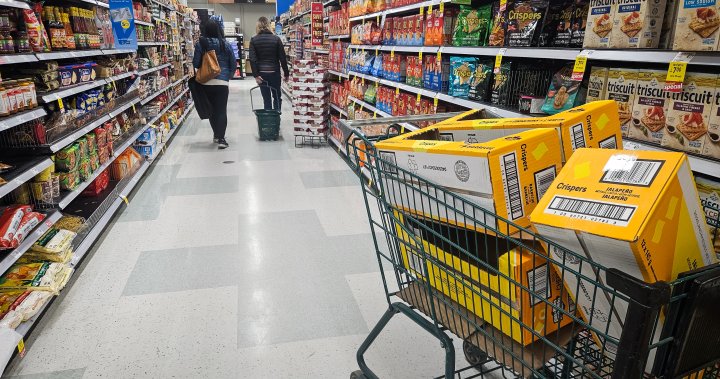Amid the ongoing trade war with the U.S., Canadians could see prices increase further as tariffs and counter-tariffs continue to weigh on everything from pantry staples to beauty products.
Companies like Loblaw and Walmart are reporting that they will need to increase prices for consumers, with the former noting that their pre-tariff inventory is set to run out, meaning those items will start seeing an increase.
A spokesperson for Loblaw told Global News that the increase could be up to 25 per cent, depending on the product and tariff amount, and applies “entirely to products coming from the U.S.”
Loblaw CEO Per Bank said in a post on LinkedIn on Wednesday that it had been aggressive in marking which products were affected by tariffs, which amounted to slightly more than 1,000 items.
But he warned in the post that the total will rise to more than 3,000 in the next week or two, and could reach 6,000 products within the next two months.
The company said in a statement this still amounts to less than 10 per cent of the more than 80,000 items the company sells across numerous stores including Shoppers, Loblaw and No Frills.
But Bank said in his post that customers would notice changes in categories including natural foods, pantry staples and health and beauty products.
As the trade war continues, companies say they are trying to mitigate prices by sourcing out products from other countries, especially with consumers looking for items not from the U.S.
Gary Sands, senior vice-president of the Canadian Federation of Independent Grocers, which represents more than 6,900 independent grocery retailers across the country, said that’s not an easy process.
Get daily National news
Get the day’s top news, political, economic, and current affairs headlines, delivered to your inbox once a day.
“It’s hard to just replace everything with alternative suppliers,” he said.
“You just can’t do that in a matter of weeks in the food industry, so there will be an impact to consumers. There will still be a number of products still coming from the (United) States where there is no alternative at this point.”
Similar price increases could be seen at independent grocers, with Sands pointing out that many operate on an overall margin of two per cent.
“So if you’re bringing in a product and there’s a 25 per cent tariff slapped on that good, that’s how much it’s going up,” he said. “You have to pass that on in its entirety, there’s just no alternative.”
Bank did say he was pleased to see the federal government changed its counter-tariff policies to limit charges to finished food products coming in from the U.S., which saw adjustments to the $60 billion counter-duties previously announced to ease the burden for Canadian companies and consumers.
Canada’s counter-tariffs have generally targeted items that have alternatives produced in Canada, so areas like dairy, poultry and grains, said Mike von Massow, a University of Guelph professor and food economist in an interview with the Canadian Press.
While many items aren’t directly tariffed by Canada, there are indirect price pressures from other areas like U.S. metal tariffs, and the general uncertainty brought on by the trade war, von Massow said.
Even though Canada has added numerous exemptions to its counter-tariff measures, they remain on high-profile grocery items like orange juice and alcohol as well as a host of other products ranging from uncooked pasta to guinea fowl in a glass jar.
Sobeys and Metro both told Global News they continue to deal with tariffs and are working to “minimize impacts” on customers.
“We have been sourcing alternatives to tariff-impacted products to help alleviate pressure for our customers, this has included an expanded selection of local and Canadian products and revised assortment,” a spokesperson for Sobeys wrote.
A representative for Metro said they are also working to prioritize Ontario and Canadian products wherever possible and are working with suppliers to “offer the best possible value.”
Walmart is also warning of price increases at least in the U.S., with the company saying it’s due to higher costs from U.S. President Donald Trump’s tariffs.
CEO Doug McMillon told industry analysts Thursday that increases would feel more gradual, but they had already begun as early as April and accelerated this month.
Tariffs on countries like Costa Rica, Peru and Colombia are raising costs on groceries like bananas, avocados, coffee and roses, he said. Walmart is absorbing costs on general merchandise within departments and not yet passing along rising costs in some cases.
Global News reached out to Walmart Canada to confirm if the retailer would also be raising costs on imported products, but did not hear back by publication.
—with files from The Canadian Press and The Associated Press
© 2025 Global News, a division of Corus Entertainment Inc.

